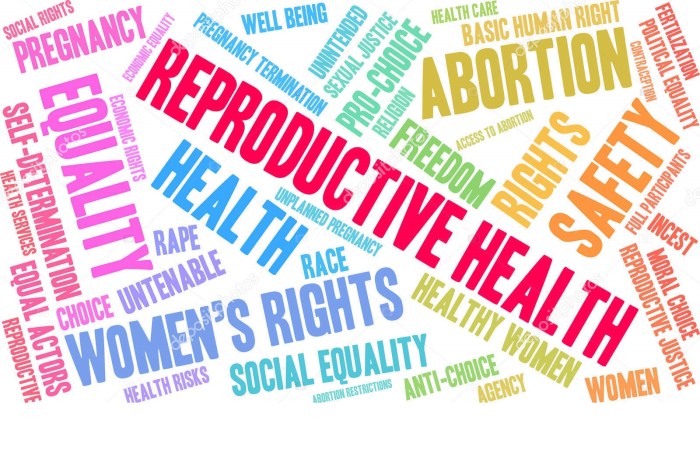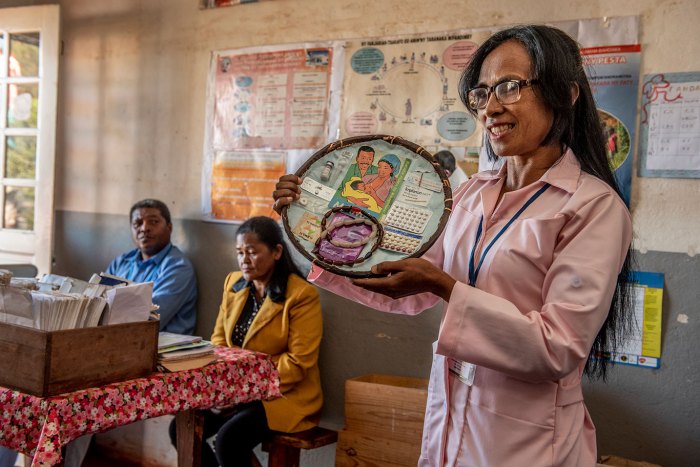
Reproductive health care for women sets the stage for this enthralling narrative, offering readers a glimpse into a story that is rich in detail with entertaining interactive style and brimming with originality from the outset.
From defining the importance of reproductive health care to exploring the barriers women face in accessing services, this topic delves into the intricate world of women’s reproductive well-being with a mix of informative insights and engaging anecdotes.
Introduction to Reproductive Health Care for Women

Reproductive health care for women refers to the medical services and support aimed at maintaining and improving the overall well-being of women’s reproductive systems. This includes a range of services such as family planning, prenatal care, gynecological check-ups, and treatment for reproductive health issues.
Importance of Reproductive Health Care
Reproductive health care is crucial for women as it plays a significant role in ensuring their overall health and well-being. By accessing reproductive health care services, women can prevent and detect reproductive health issues early, receive appropriate treatment, and make informed decisions about their reproductive health.
- Ensures healthy pregnancies and childbirth
- Prevents and treats reproductive health issues such as infections and cancers
- Promotes family planning and contraceptive use
- Empowers women to make informed choices about their reproductive health
Key Components of Reproductive Health Care
Reproductive health care encompasses various components that are essential for women to maintain their reproductive health and well-being. These components include:
- Family Planning: Providing information and access to contraception to help women plan and space their pregnancies.
- Prenatal Care: Monitoring the health of pregnant women and their developing fetuses to ensure a healthy pregnancy and childbirth.
- Gynecological Check-ups: Regular examinations to detect and prevent reproductive health issues such as infections, irregularities, and cancers.
- STI Prevention and Treatment: Education, testing, and treatment for sexually transmitted infections to promote sexual health and well-being.
Access to Reproductive Health Services
Access to reproductive health services is crucial for women worldwide, yet numerous barriers hinder their ability to obtain the care they need. These barriers can vary depending on the region or country, leading to disparities in access and quality of services.
Barriers to Access
- Lack of healthcare facilities: In many rural areas, women may have to travel long distances to reach a healthcare facility that offers reproductive health services.
- Financial constraints: High costs associated with reproductive health services, including consultations, tests, and medications, can prevent women from seeking care.
- Social stigma: Cultural norms and taboos surrounding reproductive health issues can discourage women from seeking help or information.
- Lack of education: Limited knowledge about reproductive health and family planning methods can prevent women from making informed decisions about their health.
Impact of Limited Access
Limited access to reproductive health services can have serious consequences for women’s health and well-being. It can lead to unintended pregnancies, unsafe abortions, maternal mortality, and the spread of sexually transmitted infections. Additionally, women may suffer from untreated reproductive health conditions, affecting their overall quality of life.
Regional Disparities
- In developed countries, women generally have better access to a wide range of reproductive health services, including contraception, prenatal care, and infertility treatments.
- In contrast, women in developing countries often face challenges such as lack of resources, inadequate healthcare infrastructure, and limited availability of skilled healthcare providers.
- Some regions have made significant progress in improving access to reproductive health services through government initiatives, community outreach programs, and partnerships with non-profit organizations.
Family Planning and Contraception
Family planning and contraception play a crucial role in reproductive health care for women. By providing women with the tools to control their fertility, they can make informed choices about when to have children, how many to have, and the spacing between pregnancies.
Different Methods of Contraception
- Birth control pills: Oral contraceptives are one of the most popular methods and are taken daily to prevent pregnancy.
- Condoms: Male and female condoms are barrier methods that help prevent pregnancy and protect against sexually transmitted infections.
- Injectables: Hormonal injections are administered every few months to prevent pregnancy.
- Intrauterine devices (IUDs): These small, T-shaped devices are inserted into the uterus to prevent pregnancy and can be hormonal or non-hormonal.
- Sterilization: Permanent methods like tubal ligation for women who do not wish to have more children.
Role of Family Planning in Reproductive Health Care
Family planning empowers women to make decisions about their reproductive health, leading to better health outcomes for both mothers and children. It allows for safer pregnancies, reduces maternal mortality, and helps in achieving desired family size.
Common Misconceptions About Contraception
- Contraception leads to infertility: This is a common myth, but most contraceptive methods do not cause long-term infertility.
- Contraception is only for married women: Contraception is for any woman who wants to prevent pregnancy, regardless of marital status.
- Contraception is 100% effective: While contraceptives are highly effective, there is still a small failure rate associated with each method.
Maternal Health Care
Maternal health care plays a crucial role in ensuring the well-being of pregnant women and their babies. It encompasses a range of services aimed at providing support and medical assistance throughout pregnancy, childbirth, and the postpartum period.
Importance of Maternal Health Care
- Regular prenatal check-ups help monitor the health of both the mother and the developing fetus, allowing healthcare providers to detect and address any potential complications early on.
- Access to skilled birth attendants and emergency obstetric care can significantly reduce the risk of maternal and neonatal mortality during childbirth.
- Postpartum care is essential for detecting and managing any post-delivery complications, ensuring the mother’s recovery and the baby’s well-being.
Challenges During Pregnancy and Childbirth
- Financial constraints may hinder women from seeking timely prenatal care or delivery assistance, leading to increased risks of complications and poor outcomes.
- Lack of access to quality healthcare facilities and trained professionals in remote or underserved areas can limit women’s options for safe maternal care.
- Social and cultural factors may influence women’s decisions regarding maternal health, affecting their ability to make informed choices and receive appropriate support.
Role of Healthcare Providers in Safe Maternal Health Care
- Healthcare providers play a vital role in educating pregnant women about proper nutrition, prenatal care, and potential warning signs during pregnancy.
- Monitoring the progress of pregnancy through regular check-ups and screenings helps healthcare providers identify and address any complications promptly.
- During childbirth, skilled birth attendants can provide necessary medical interventions, support, and guidance to ensure a safe delivery for both the mother and the baby.
Reproductive Rights
Reproductive rights are fundamental human rights that encompass the right to make decisions concerning reproduction free from discrimination, coercion, and violence. These rights are crucial for women’s health as they empower individuals to have control over their bodies, health, and well-being.
Significance of Reproductive Rights for Women’s Health
Reproductive rights play a vital role in ensuring that women have access to comprehensive reproductive health care services, including family planning, contraception, maternal health care, and safe abortion. By upholding these rights, women can make informed choices about their reproductive lives, leading to better health outcomes and overall well-being.
- Reproductive rights promote gender equality by giving women the autonomy to decide if, when, and how many children they want to have.
- These rights help reduce maternal mortality rates by ensuring access to quality maternal health care services, including prenatal care, skilled birth attendance, and postnatal care.
- Reproductive rights also contribute to the prevention of sexually transmitted infections (STIs) and HIV/AIDS through access to comprehensive sexual health education and services.
Impact of Reproductive Rights on Access to Health Care Services
Reproductive rights directly influence the availability, affordability, and quality of reproductive health care services for women. When these rights are upheld, individuals can access a range of services without facing discrimination or barriers based on gender, age, marital status, or socio-economic status.
Ensuring reproductive rights can lead to improved health outcomes, reduced maternal mortality, and increased gender equality in society.
- Reproductive rights empower women to seek timely and appropriate reproductive health care services, including contraception, prenatal care, and safe abortion.
- By recognizing reproductive rights, health care providers are obligated to offer non-judgmental and confidential services that respect individuals’ autonomy and decision-making power.
- Accessible and affordable reproductive health care services can help address disparities in health outcomes and promote overall well-being among women and communities.
Intersection of Reproductive Rights with Social, Cultural, and Political Factors
Reproductive rights are deeply intertwined with social norms, cultural beliefs, and political ideologies that shape individuals’ access to and utilization of reproductive health care services. The recognition and protection of these rights require addressing broader societal issues and advocating for policies that uphold human rights and gender equality.
- Social norms and cultural practices may influence women’s autonomy in decision-making regarding their reproductive health, highlighting the importance of education and awareness-raising initiatives.
- Political factors, such as legislative policies and funding allocations, can either support or hinder the realization of reproductive rights and access to essential health care services for women.
- Advocacy efforts and grassroots movements play a crucial role in advancing reproductive rights agendas and holding governments and institutions accountable for upholding these rights.
SPA AND WELLNESS
Spa and wellness are essential components of self-care that focus on promoting overall well-being through a combination of relaxation, rejuvenation, and therapeutic treatments.
Benefits of Spa Treatments for Women’s Reproductive Health
Spa treatments can have numerous benefits for women’s reproductive health, including:
- Reducing stress levels: Stress can have a negative impact on reproductive health, and spa treatments such as massages and aromatherapy can help alleviate stress and promote relaxation.
- Improving circulation: Treatments like hydrotherapy and body wraps can improve blood flow and circulation, which is essential for reproductive health.
- Balancing hormones: Certain spa treatments, like acupuncture and reflexology, can help balance hormones and promote overall reproductive health.
- Enhancing fertility: Spa treatments that focus on relaxation and stress reduction can help improve fertility outcomes for women trying to conceive.
- Promoting mental well-being: Taking time for self-care and relaxation at a spa can have positive effects on mental health, which is closely linked to reproductive health.
Importance of Self-Care in Promoting Overall Well-being
Self-care is crucial for maintaining overall well-being, and spa and wellness treatments play a significant role in this process. Some key reasons why self-care is important include:
- Preventing burnout: Regular self-care practices, such as spa treatments, can help prevent burnout and promote resilience in the face of stress.
- Boosting mood: Engaging in self-care activities can improve mood and overall mental health, contributing to a sense of well-being and fulfillment.
- Enhancing physical health: Spa treatments like massages and facials can have physical health benefits, such as reducing muscle tension and improving skin health.
- Promoting relaxation: Taking time for self-care allows individuals to relax and recharge, which is essential for maintaining a healthy work-life balance.
REPRODUCTIVE HEALTH
Reproductive health is a crucial aspect of overall well-being for women. It encompasses a wide range of issues that can impact fertility, pregnancy, and overall reproductive system function.Regular check-ups play a vital role in maintaining reproductive health as they help in early detection of any potential issues or abnormalities. These check-ups can include pelvic exams, Pap smears, breast exams, and screenings for sexually transmitted infections.
Common Reproductive Health Issues
- Menstrual irregularities: including heavy or painful periods, irregular cycles, or absence of menstruation.
- Polycystic Ovary Syndrome (PCOS): a hormonal disorder that can cause irregular periods, acne, and fertility issues.
- Endometriosis: a condition where tissue similar to the lining of the uterus grows outside the uterus, leading to pain and infertility.
- Sexually Transmitted Infections (STIs): infections that are transmitted through sexual contact and can affect reproductive health.
Role of Preventive Measures
Regular exercise, maintaining a healthy weight, practicing safe sex, and avoiding smoking and excessive alcohol consumption can help prevent reproductive health issues. Additionally, staying up to date on vaccinations, such as the HPV vaccine, can reduce the risk of certain infections that impact reproductive health.
HEALTH PHOBIAS

Health phobias are intense fears or anxieties related to health issues that can significantly impact a person’s well-being. In the context of women’s reproductive health care, these phobias can manifest in various ways, such as fear of medical procedures, anxiety about reproductive health conditions, or avoidance of seeking necessary care.
Strategies for Overcoming Health Phobias Related to Reproductive Health Care
- Educate Yourself: Take the time to learn about reproductive health issues, procedures, and treatments to demystify the unknown and reduce fear.
- Seek Support: Talk to healthcare providers, counselors, or support groups to address your fears and receive guidance on managing anxiety.
- Gradual Exposure: Start by taking small steps towards facing your fears, such as scheduling a check-up or consultation, to gradually build confidence.
- Practice Relaxation Techniques: Incorporate relaxation methods like deep breathing, meditation, or yoga to help calm your mind and body during stressful situations.
Importance of Mental Health in Overall Health and Wellness
Maintaining good mental health is essential for overall well-being, including reproductive health care. Mental health impacts how we think, feel, and act, influencing our ability to cope with stress, make decisions, and engage in self-care practices. By addressing mental health concerns, women can better navigate reproductive health challenges and access the care they need for a healthier and fulfilling life.
Ultimate Conclusion
As we wrap up our discussion on reproductive health care for women, it’s clear that prioritizing women’s health leads to not just physical well-being but also empowerment and autonomy. By understanding the complexities and challenges women face, we pave the way for a future where women’s reproductive health is given the attention and care it truly deserves.
Common Queries
What are some common misconceptions about contraception?
Some common misconceptions include the belief that contraception leads to weight gain or infertility, which are not supported by scientific evidence. It’s important to consult healthcare providers for accurate information.
How do reproductive rights intersect with cultural factors?
Reproductive rights can be influenced by cultural norms and beliefs, impacting access to healthcare services and decisions regarding reproductive choices. Understanding these intersections is crucial for promoting women’s health and autonomy.
What are some preventive measures for common reproductive health concerns?
Maintaining a healthy lifestyle, regular check-ups, practicing safe sex, and staying informed about reproductive health issues are important preventive measures to promote overall well-being.
How can women overcome health phobias related to reproductive health care?
Seeking support from healthcare professionals, educating oneself about reproductive health, and addressing underlying fears through therapy or counseling can help women overcome health phobias and prioritize their well-being.



